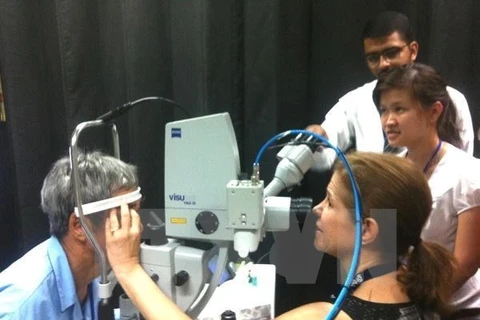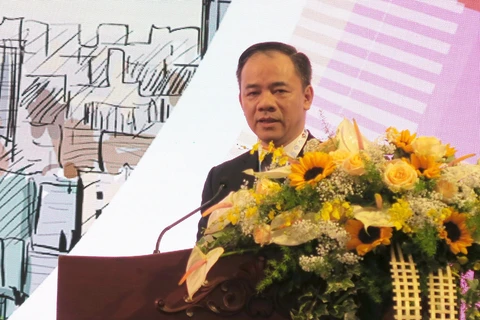Hanoi (VNA) – A policy advocacy seminar discussing employment for refraction ophthalmology bachelors took place in Hanoi on August 21.
The event attracted leaders of municipal and provincial health departments, eye hospitals from Hanoi, Ho Chi Minh City, Can Tho, Phu Tho and Ha Dong, educational establishments and international organisations in the field.
Tran Viet Hung, deputy head of the Health Ministry’s Personnel Organisation Department, said Vietnam now records about 2 million blind and visually-impaired people. Over 80 percent of blind cases could be prevented or treated.
Currently, short-sighted, long-sighted and astigmatism cases are becoming popular, amounting to 15 – 40 percent of the population, or about 14- 36 million patients. For children aged 6 – 15, the rate of refraction cases is 25 – 40 percent in urban areas and 10 – 15 percent in rural areas.
The International Agency for the Prevention of Blindness recommended that there should be a refraction services provider per 50,000 people. However, there are only 39 standard service providers in Vietnam.
Since 2012, the Hanoi Medical University and the Pham Ngoc Thach University of Medicine have offered refraction ophthalmology courses with the first contingent of bachelors graduating in October last year. About 300 students are studying in the two universities.
Participants at the event shared models for eye treatment, measures to effectively tap the role of refraction ophthalmology bachelors in order to highlight the need to build regulations on job titles for them.-VNA
The event attracted leaders of municipal and provincial health departments, eye hospitals from Hanoi, Ho Chi Minh City, Can Tho, Phu Tho and Ha Dong, educational establishments and international organisations in the field.
Tran Viet Hung, deputy head of the Health Ministry’s Personnel Organisation Department, said Vietnam now records about 2 million blind and visually-impaired people. Over 80 percent of blind cases could be prevented or treated.
Currently, short-sighted, long-sighted and astigmatism cases are becoming popular, amounting to 15 – 40 percent of the population, or about 14- 36 million patients. For children aged 6 – 15, the rate of refraction cases is 25 – 40 percent in urban areas and 10 – 15 percent in rural areas.
The International Agency for the Prevention of Blindness recommended that there should be a refraction services provider per 50,000 people. However, there are only 39 standard service providers in Vietnam.
Since 2012, the Hanoi Medical University and the Pham Ngoc Thach University of Medicine have offered refraction ophthalmology courses with the first contingent of bachelors graduating in October last year. About 300 students are studying in the two universities.
Participants at the event shared models for eye treatment, measures to effectively tap the role of refraction ophthalmology bachelors in order to highlight the need to build regulations on job titles for them.-VNA
VNA
























